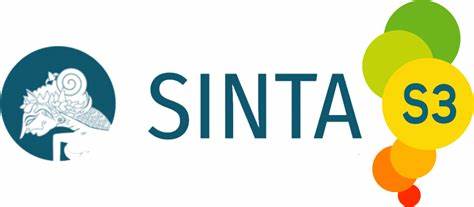A NEED ANALYSIS OF TASK ACTIVITY IDENTIFIED FOR TOURISM STUDENTS IN LISTENING AND SPEAKING INTEGRATED SKILL
DOI:
https://doi.org/10.22460/eltin.v10i1.p31-44Keywords:
Integrated Skill, Listening and Speaking, Need Analysis, Students’ Experiences, Task Activity, Tourism,Abstract
Task activity is part of learning to enhance the improvement students’ skill, especially integration skills of listening and speaking. However, many researchers have identified task activity and integration skill separately. This descriptive research focuses on identifying three aspects of need analysis such as Target Situation Analysis (TSA), Present Situation Analysis (PSA), and Learning Situation Analysis (LSA). The aim of this research is to find out appropriate task activity and materials based on students’ experiences learning in listening and speaking integrated skills. Data collection used interview from four tourism students, and analyzed English and major specific syllabus. The result of this study indicates that English lesson should adapt materials in major specific lesson, because materials affected to find suitable listening and speaking integrated task activity. The underlined result of this research is task activity can increase with new strategy and instruction which consider to previous learning, students’ lack, and students’ necessities. Implication need analysis showed listening and speaking integrated task activity is important to apply in English vocational school to achieve learners’ target skill.
References
Aleksandra Malicka, R. G. (2017). From needs analysis to task design: Insights from an English for specific purposes context. Language Teaching Research, 1-29. doi:https://doi.org/10.1177/1362168817714278
Braun, V., & Clarke, V. (2006). Using thematic analysis in psychology. Qualitative Research in Psychology, 3, 77–101. doi:10.1191/1478088706qp063oa
Brown, J. D. (1995). The elements of language curriculum: A systematic approach to program development. Cambridge: Cambridge University Press.
Creswell, John W. (2012). Educational Research Planning, Conducting, and Evaluating Quantitative and Qualitative Research. Pearson Publisher
Ellis, R. (2020). Taking the critics to task: The case for task-based teaching. Brought to you, 25-37. doi:https://doi.org/10.1515/9781501505034-002
Hadley, A. O. (1993). Teaching language in context. Boston, MA: Heinle & Heinle.
Hassan Soodmand Afshar, H. M. (2016). EAP education in Iran: Where does the problem lie? Where are we heading? Journal of English for Academic Purposes, 135-151. doi:http://dx.doi.org/10.1016/j.jeap.2016.04.002
Huang, X. (2018). The Effectiveness of Needs Analysis Informing ESP Syllabus Design. Journal of Education, Society and Behavioural Science, 1-7. doi:10.9734/JESBS/2018/46327
Hutchinson, T. &. (1987). English for specific purposes. Cambridge: Cambridge University Press.
Iizuka, T. (2019). Task-based needs analysis: Identifying communicative needs for study abroad students in Japan. System, 1-40. doi:https://doi.org/10.1016/j.system.2018.11.005
Investigating the validity of an integrated listening-speaking task: A discourse-based analysis of test takers' oral performances. (2012). Language Testing, 29: 345. doi: 10.1177/0265532211424479
Lambert, C. (2010). A task-based needs analysis: Putting principles into practice. Language Teaching Research, 14: 99. doi: 10.1177/1362168809346520
Lapele, F. (2019). NEED ANALYSIS ON THE MATERIAL DEVELOPMENT OF TEACHING ESP SPEAKING. DEVELOPMENT OF TEACHING, 336-349.
Lee, P. C. (2017). Educational technology in hospitality management programmes: Experience and expectation. International Journal of Tourism Sciences, 153–164.
Leong, A. M. (2018). A study on English teaching improvement based on stakeholders’ needs and wants: The case of the Faculty of International Tourism of the Macau University of Science and Technology (MUST). Journal of Hospitality,Leisure, Sport & Tourism Education, 67-78. doi:10.1016/j.jhlste.2012.02.011
Long, M. (2015). Second language acquisition and task-based language teaching. Chichester: John Wiley, 15-24.
McDonough. (1984). ESP in perspective A practical guide. London: Collins ELT.
Murray, G. (2009). Narrative Inquiry. Okayama: Reaearch Gate. doi:10.1057/9780230239517_3
Nation, I. S. (2009). Teaching ESL/EFL Listening and Speaking. New York: Routledge.
Nassaji, H. (2015). Qualitative and descriptive research: Data type versus data analysis. LANGUAGE TEACHING RESEARCH, 129–132. doi:10.1177/1362168815572747
Prachanant, N. (2012). Needs Analysis on English Language Use in Tourism Industry. Social and Behavioral Sciences, 117 – 125. doi: 10.1016/j.sbspro.2012.11.253
Sang Hyeon Park, H. Y.-B. (2018). Perceptions of university students of ‘tourism-focused English’ as a second language: The case of Korean universities. Journal of Hospitality, Leisure, Sport & Tourism Education, 59-69. doi:https://doi.org/10.1016/j.jhlste.2018.05.001
Sayed Younis Abdel Ghany, M. M. (2012). English language preparation of tourism and hospitality undergraduates in Egypt: Does it meet their future, workplace requirements? Journal of Hospitality, Leisure, Sport & Tourism Education, 93-100. doi:http://dx.doi.org/10.1016/j.jhlste.2012.05.001
Tavil, Z. M. (2010). Integrating listening and speaking skills to facilitate English language learners’ communicative competence. Procedia Social and Behavioral Sciences, 765–770. doi:10.1016/j.sbspro.2010.12.231
Wei, W. (2015). Can integrated skills tasks change students’ learning strategies and materials? The Language Learning Journal, 19:22. doi:http://dx.doi.org/10.1080/09571736.2014.905970
Ya-Ting Carolyn Yang*, Y.-C. C.-Y.-S. (2013). A blended learning environment for individualized English listening and speaking integrating critical thinking. Computers & Education, 285-305. doi:http://dx.doi.org/10.1016/j.compedu.2012.12.012
Yu, Y., & Wang, B. (2009). A study of language learning strategy use in the context of EFL curriculum and pedagogy reform in China. Asia Pacific Journal of Education, 29(4), 457–468.





